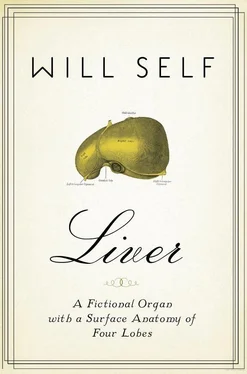Speeding up, slowing down, but mostly in sync — as a computer-generated effect is edited into an early silent film — the Martian went about his work. Once in Val’s nook he became a blur: feeding Val sips of vodka through the straw; putting a frame beneath the bedclothes to give himself ease of access to the abdomen; removing the instruments and further equipment he required from the cupboard, then arranging these under the bed.
Timing was crucial: for the product to have the highest possible value, it had to be removed, entire, at the precise moment when the portal haemorrhage occurred. Too early and there would be too much blood in the liver; too late and there would be too little.
In the centuries since the Martian — or another of his kind — had nudged humans in the direction of ‘discovering’ the distillation of alcohol, there had been a few scores of them at work during any given epoch. All sorts of methods had been tried in order to perfect this gavage . The Martian had himself developed many different techniques, from performing ‘split-liver’ transplants of cirrhotic organs into the bodies of S  o Paulo street urchins, then tending them until harvest, to working with hebephrenic living ‘donors’. He had force-fed his human geese with fine burgundies, arrack, poteen and cider; he had soused them with Marsala and drenched them with ale. But, after centuries of experimentation, he had decided that the best possible results were achieved when the gavage was undertaken at a natural pace, with voluntary subjects.
o Paulo street urchins, then tending them until harvest, to working with hebephrenic living ‘donors’. He had force-fed his human geese with fine burgundies, arrack, poteen and cider; he had soused them with Marsala and drenched them with ale. But, after centuries of experimentation, he had decided that the best possible results were achieved when the gavage was undertaken at a natural pace, with voluntary subjects.
Pure grain alcohol imparted the most nodulous appearance to the necrotic tissue — a finish that was highly sought after by the Martian’s gourmet clients.
Feeling the cold metal of the frame press his flesh, Val surfaced from the mire of his moribund brain. Seeing the concern on the Martian’s face mask, he whined, ‘Giss some acqua, Marshy’, and when his carer obliged with the Gogol, Val sank back on the pillow, sighing, ‘I’m croaking, Marshy, you cunt.’
The Martian nodded sympathetically to indicate that this was indeed true.
‘Lissen.’ Val’s eyes, stripped of their shades, glittered unnaturally. ‘I ain’t got long, Marshy, but you’ll grant an omi-paloni ’is final wish — won’cher?’
Again, the Martian nodded.
‘Juss yer lapper, cunt.’ Val groped for the Martian’s hand. ‘I ain’t after a bloody jarry — only a fucking sherman.’
Even if the Martian hadn’t understood Polari — which he did, perfectly — the dying man’s feeble motions would have instructed him. As it was, Val’s desires coincided perfectly with his own: with his hand on Val’s penis, the Martian could both increase Val’s sluggish heart rate, and sense the precise moment when the rotten wall of his portal vein ruptured.
Culinary savants differed on the question of how an animal’s state of mind affected the quality of its liver, but most agreed that fear and disillusionment engendered a pleasing deliquescence to the fat-engorged tissue. With the more philosophically inclined beasts, it was even worth while giving them a snapshot — as much as their limited minds could take in — of the wider picture.
As he masturbated Val, the Martian spoke to him urgently. It would be onerous to translate from the Cockney, the back-slang and the Polari he employed, but the substance of what he had to relate was that Val’s entire life had been leading up to this: at the very instant of his expiration, he, the Martian, would cut out Val’s rotten liver.
So it was that Val Carmichael died, eyes wide with astonishment and horror, a final valedictory ‘Cuuuunt’ rattling between his bluing lips.
At once the Martian set to work properly, his hands a blur beneath the covers as he made the incision in the upper abdomen, then clamped and sutured with machine rapidity. A passing nurse — a wanderer in this city of death — chanced to poke her nose into the nook and, noting that Val’s own nose was losing its angry hue, taxed the Martian: ‘Is Mr Carmichael all right?’
And even though at that precise moment the Martian was speedily dividing all the ligamentous attachments — common bile duct, hepatic artery, portal vein — that held Val’s liver snug in his abdominal cavity, he had also had the foresight to close the dead man’s eyes and was able to say, with believable sincerity, ‘He’s just resting, sister, I think he had a difficult night.’
Convinced, the nurse moved off, leaving the Martian to complete in twelve minutes an operation that would have taken a skilled human surgeon — were he minded to transplant a pig’s liver into a man — some five or six hours.
Pausing for a fragment of a second to admire the perfection of the foie humain entier that he had removed — its pleasing heft, its bloody-beige marbling, its glistening wartiness — the Martian wrapped it in the greaseproof paper Lidgate’s had provided and popped it into his string shopping bag.
Instruments wiped and stashed, bed rearranged and cadaver rearranged in it, the Martian left the nook without a backward glance. No poultry keeper in the Dordogne — no matter how mimsy or sentimental — sticks around to mourn a goose; and I think we can all concur that, as geese go, Val Carmichael was one of the least endearing.
Dear, perceptive reader, you will have grasped by now that Peter Stenning, aka ‘the Martian’ (and aka, for that matter, ‘Peter Stenning’), was an extraterrestrial — an ‘alien’ in common parlance. To see him wend his way through the mid-morning traffic on Ladbroke Grove — resisting a strong impulse to break into a run faster than the 100-metre World Record holder — would have been enough to confirm this for an acute observer; no sixty-something on earth has such a swift and supple gait.
But were I to tell you that, should he have wished to, the Martian could have taken to the air, flipping, rolling and weaving through the power lines, and between the chimney pots, at twice the speed of sound, I would, perhaps, stretch your credulity; or, rather, invite you to speculate on the nature of the Martian’s real appearance, shorn of the fleshly overall of his assumed humanity.
Such speculations are useless. Insectoid, arthropod, protoplasmic blob, cyborg, robot built from purest iridium with laser-polished coltan fittings — these are the feeble projections of human imagineers on to the mighty screen that is the universe. It is sufficient to paraphrase Wittgenstein, and note only that if we were able to see the Martian as he really was, we wouldn’t understand what it was we were witnessing.
So, on this basis, let us go with him to Totteridge, to the shuttered light-industrial premises between the Great North Road and the South Herts Golf Course that Stenning Offset used to occupy. Unobserved, save by us, the Martian undid the padlocks and went inside. As soon as the door was locked he resumed the pace of action last witnessed at the St Charles. Even so, it took him the best part of the day to fuel, programme and then load the craft that would carry Val Carmichael’s liver on its 38-light-year voyage to the Martian’s home planet.
Late that evening the Martian sat with Hilary and Her Ladyship in the snug back bar of the French in Soho. The Martian raised his glass and muttered ‘Bon voyage’. The others had no idea what he was talking about and assumed that he was drunk. But the Martian had never been drunk in any of his two thousand, six hundred and forty-six solar years.
At that precise moment, in Totteridge, the roof of Stenning Offset exploded in a sheet of white flame and a smoothly tapered ellipsoid lifted off into the sodium-stained London night. It was invisible to either human eye or human instrumentation, and, although it left considerable devastation in its wake, no one was injured. Leant upon by the gas company, the insurers paid out without a murmur.
Читать дальше

 o Paulo street urchins, then tending them until harvest, to working with hebephrenic living ‘donors’. He had force-fed his human geese with fine burgundies, arrack, poteen and cider; he had soused them with Marsala and drenched them with ale. But, after centuries of experimentation, he had decided that the best possible results were achieved when the gavage was undertaken at a natural pace, with voluntary subjects.
o Paulo street urchins, then tending them until harvest, to working with hebephrenic living ‘donors’. He had force-fed his human geese with fine burgundies, arrack, poteen and cider; he had soused them with Marsala and drenched them with ale. But, after centuries of experimentation, he had decided that the best possible results were achieved when the gavage was undertaken at a natural pace, with voluntary subjects.










